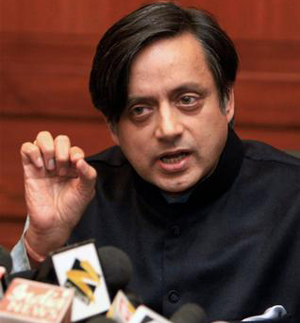New Delhi, Nov 5: An atonement or an apology by the British Prime Minister or the Queen will "wash away a lot" of the atrocities committed by Britain on India during its colonial rule, Congress leader Shashi Tharoor today said.
 "I would prefer instead an active atonement. An apology would go a long way. I am not expecting it today, tomorrow or anytime soon and certainly not during the visit of the new (Britain) Prime Minister (Theresa May)," Tharoor said, referring to May's visit to India next week.
"I would prefer instead an active atonement. An apology would go a long way. I am not expecting it today, tomorrow or anytime soon and certainly not during the visit of the new (Britain) Prime Minister (Theresa May)," Tharoor said, referring to May's visit to India next week.
He said an immediate step towards it would be to teach the realities of colonialism to British school children.
The Lok Sabha MP from Thiruvananthapuram was speaking at a book launch 'An Era of Darkness: The British Empire in India', which was launched by Vice President Hamid Ansari here.
Tharoor said, in the past German Chancellor and leader of the Social Democratic Party Willy Brandt visited the Warsaw ghetto and apologised to the Jews for the acts of the Nazis.
He also referred to Canadian Prime Minister Justin Trudeau, who in May this year, apologised for the Komagata Maru, a Japanese steamship, that arrived in Vancouver after leaving Hong Kong in early April. On board were 376 passengers, most of whom were Sikh migrants from what was then British India. The ship was not allowed to dock.
"It shows how required it is for a British leader of some significance either a Queen or the PM to simply say sorry. It will wash away a lot. You can't count value the loss of lives during the famine, of the massacres, the rapes, the loot that took place.
"Another thing that could happen would be if the British can make up by teaching their young generation about what happened in the past. After all the beauties of London were built from the resources extracted from the Common Wealth," the Congress leader said.
Speaking about the colonial legacy in Indian laws related to aspects like Freedom of Press and a one-day ban on a leading Hindi channel 'NTDV India', Tharoor said he was not happy about the "unusual punishment" meted out to the channel for its reporting of Pathankot terror attack.
He said all these are "troubling issues for the Indian democracy". Tharoor also hit out at the government for not repealing Section 377 of the Indian Penal Code. He had introduced a legislation in Lok Sabha, seeking repealing of the section.
"I find it somewhat ironic that a party of Hindutva, actually claiming to speak for a religion that has 2000 years of recorded tolerance for various kinds of sexual practises...
A religion where there is no recorded instances of persecution or prosecution of such practices, but people speaking for such a party have instead abandoned the option of being true to their own cultural traditions and instead accepted and embraced a Victorian moral code written by T B Macaulay in 1837, enacted in 1861 and abandoned by the British in late 1960s," he said.
Ansari said economic deprivation was one aspect of the colonial rule, but more serious was its impact on the minds of the subjugated and on the totality of their existence.
"The encroachment by the East India Company was piecemeal, and resentment or resistance was per force local. "It often took the shape of peasant uprisings motivated by economic deprivation of severe character often inflicted through physical brutality or ethnic prosecution. It was at times led by local landlords.
"Some of these conflicts involved large numbers but organized military confrontations, of the type with Tipu Sultan of Mysore, were the exception. Nevertheless, these popular resistance movements continued for almost a century," the Vice-President said.





Comments
Tharoor hurts feeling of some who hate Bhagat Singh, Tippu Sultan and other Freedom fighters of India since they fought against forefathers of \Some\"."
Add new comment